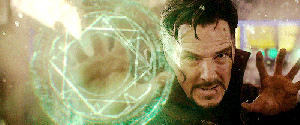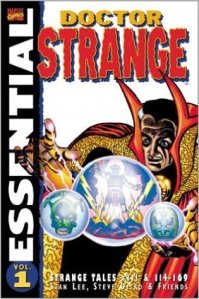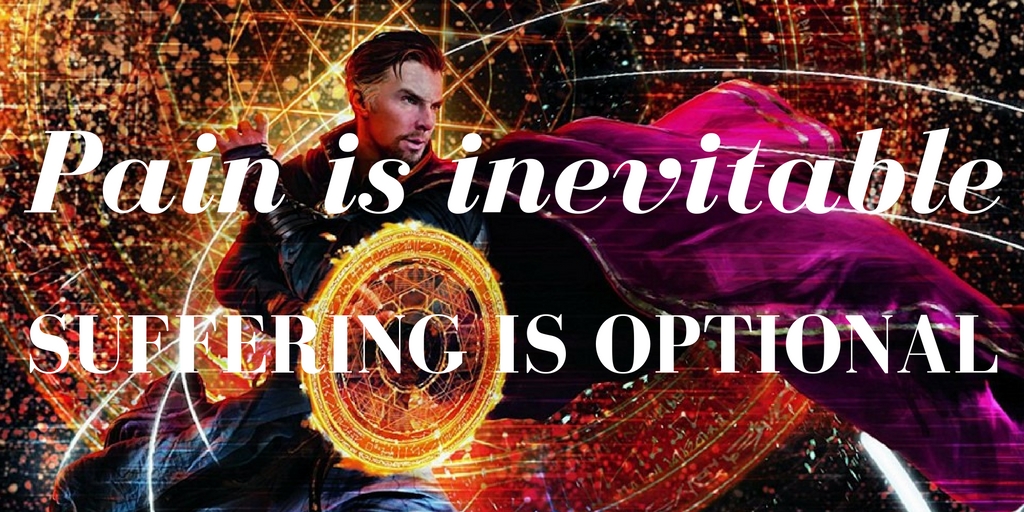SPOILERS AHEAD.
It’s a familiar story by now. A straight white male – and it almost always is a straight white male – is living a kind of ordinary life when BAM! Events transpire that send Mr. Straight White Male on an epic adventure through which he gains Incredible Powers of magic and / or kung-fu. Star Wars? The Matrix? Every goddamn “Heroes Journey” narrative ever written. And now here we are again, with Doctor Strange.
“And it’s definitely not magic. Quite the opposite, Buddhism teaches its students to engage with the reality of the here and now.”
At some point our Straight-White-Male-Hero-Destined-To-Master-KungFu ends up studying with someone who looks a lot like a Buddhist monk, in something a lot like a Buddhist temple. Because, as we all know, Buddhism IS the gateway to to an altered perception of reality that unleashes powers of magic / kung-fu, right? Doctor Strange literally travels to Tibet (Nepal in the movie, because, you know, Hollywood doesn’t want to alienate the Chinese market) where he meets the “Ancient One” (who in the movie is randomly CELTIC, see above reason) who inducts him into House Gryffindor, so he can fight the evil Slytherin menace. Oh wait, getting my magical induction stories confused.
It’s all great. I love the Doctor Strange movie, and I’m a sucker for this kind of story. But then I (mostly) conform to its demographic targeting. And I love the more recent twist of having a really cute straight white woman in the lead role, although I’m honestly not sure this is as radical a demographic shift as is sometimes claimed. I’d like to see more dowdy middle aged protagonists go on magical adventures. They’re the ones, I think, who really need it.
Enjoying the read? You can help me write more.
But can we please clear something up here? BUDDHISM IS NOT THE GATEWAY TO SECRET MAGICAL POWERS. It doesn’t matter how many thousands of hours you spend in meditation, you’ll never be able to summon power from other dimensions, conjure cool looking glowing sigils with wavy hand movements, or indulge in the joys of astral projection. Got it?

“Oh Damo!” I hear one of you sigh, “You’re just taking this all too seriously! Nobody believes Buddhism can REALLY give them magical powers. Any more than they believe they can really upload their mind into a computer to achieve immortality! Oh, wait, loads of people do actually believe that…” As, in fact, do many people really genuinely believe Buddhism will give them magic powers. And much as I would like to blame this on Hollywood, it’s a much, much older problem.
While I’m lucky not to have had my hands crushed in an automobile accident, my own life took me into the Himalayan mountains, to study at the Buddhist temples in Dharamsala. I’ve been a student of Buddhism for eight years now. I stepped out of a successful, creative career – that was killing me incrementally – and Buddhism was part of what helped me transition to a different kind of life. Now I live in Thailand, a Buddhist nation, to study Theravada Buddhism. In 2015 I travelled across India, to the capital of the Tibetan government in exile, and home of the Dalai Lama in Dharamsala, to study Mahayana Buddhism.
That’s my path. No doubt, if enough people read this, somebody will crop up who’s all like “Well I went to Nepal and I TOTALLY learned how to do hand wavy magic stuff you just got the wrong brand of Buddha Damo the cheap stuff without the MAGIC” and OK, fine, I have met some of those people. They are welcome to their beliefs. And you can have those arguments within Buddhist circles, they’re absolutely part of the dialectic learning process Buddhist teaching guides students through. Because from some angles, Buddhism can seem quite magical. Which is why it’s important to remember that it isn’t.
When the Buddha was asked about things like magic powers, he always had the same reply. And he got asked a lot. India of 2500 years ago, around when it’s believed the Buddha lived, was a melting pot of every kind of spiritual belief you can think of. Spiritual teachers made a good living wandering the land, giving out all kinds of teachings, with the secrets of magical powers among them. And the Buddha spent years of his life studying these paths, before eventually arriving at the Middle Way described in Buddhism. So when people asked about gaining magical powers, the Buddha would simply say, that’s not what Buddha teaches. Buddha only teaches the way out of suffering. (Buddha talks about himself a lot in the third person. I know, right?)

Doctor Stephen Strange is seeking a way out of suffering. After his hands are shattered, he wants a cure. And most people who come to Buddhism are suffering. It might be a terrible illness. It might be depression. It almost certainly centers on some kind of loss. Loss of power, loss of status, loss of love. All of Buddhist teaching resolves down to the question of suffering, and how best to deal with it. And of course, gaining magical super-powers is a SUPERB way of dealing with suffering. Woosh! Just wave your magic wand and the cause of suffering is fixed! Except when it isn’t. Which is most of the time. One of the reasons I like the Doctor Strange movie is because it doesn’t let the character off the hook that easily. Strange has to accept that his hands will never truly recover. He has to accept his suffering.
The acceptance of suffering is, as best as I can express it, the starting point of Buddhism. You really have lost your job. You really do have a broken arm. You really have lost the person you love. From that acceptance, the pain might transform to something else. Or you might have to accept that it’s going to stay a long time, maybe for your whole life. It’s not easy. Nobody can do it without great attention. And it’s definitely not magic. Quite the opposite, Buddhism teaches its students to engage with the reality of the here and now, as deeply and fully as they possibly can. Which is why there’s a great irony, and no small danger, in how the entertainment industry constantly makes Buddhism a gateway to magic, fantasy and escapism.
But. If we can remember that magic is just a metaphor, a way of talking about things we can’t talk about literally, then like all myths, it can be very useful to think about. The Doctor Strange movie works so well because it’s aware of its own metaphorical meanings, in a way that a story like the vomit inducingly awful Batman vs Superman never even came close to being. If you find the time to see Doctor Strange, I hope you’ll tell me what those wonderfully woven magical metaphors meant to you. I’d love to know!
No comments here. Come over and shout at me on Twitter or Facebook.
